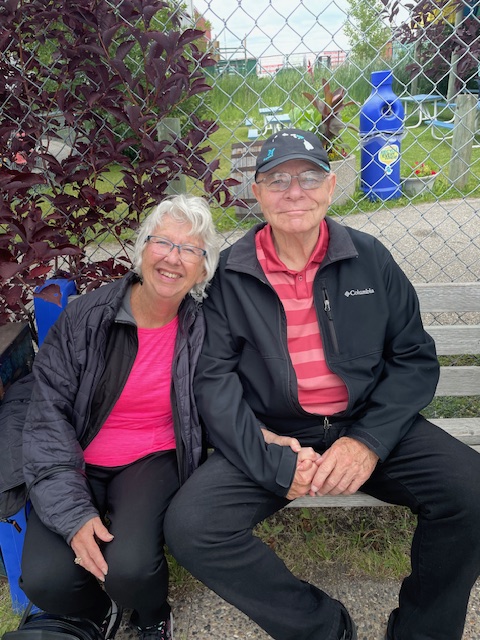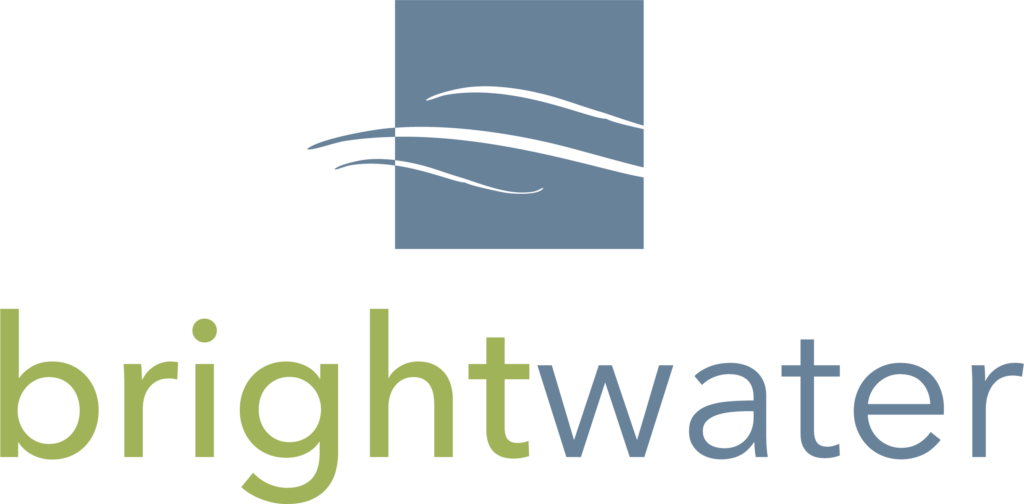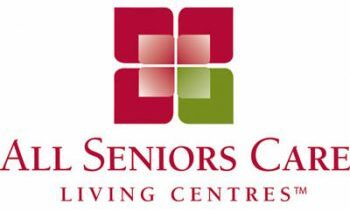A Day of Education and Connection for Care Partners
Cathy Watson can’t wait to attend the Alzheimer Society’s annual Care4u Family Conference taking place on October 19th.
The day-long conference at the Victoria Inn Hotel and Convention Centre has a variety of breakout sessions covering things like home safety, communication and responsive behaviours, meaningful activities and legal and financial matters – so many helpful topics that Cathy said she had a hard time choosing which ones to attend.
And for that matter, she’s just excited to be able to attend in person, knowing her husband Gray will be safely cared for at home. That’s because the Society’s First Link® Client Support staff suggested Cathy apply for self and family-managed care through the Provincial Home Care program, which is now in place. Cathy can benefit from respite care and she’s happy to spend some of those hours at the upcoming Care4u conference.
Gray is 76 and lives with Lewy Body Dementia. Cathy began noticing the signs five years ago.
“I started noticing something was off in 2019 and we got a formal diagnosis in 2020,” she says. “We are still managing but Gray is progressing. I feel like I’m living in an unreal world all the time. A current challenge we face is him constantly seeing things that aren’t there and talking about things that aren’t really happening.”
She and her husband, who had a career as a warehouse manager, have attended Minds in Motion and Tales Along the Trail, two of several community programs the Society offers, which have given the couple opportunities to do things together. But Cathy is looking forward to the conference.
“It will be nice to have a day of respite, for one thing, and to meet other caregivers face-to-face, connecting with them and sharing with them. I may recognize people I’ve connected with online, too. It will be the first time coming together with others through the Society without Gray, without worrying about him,” she says.
The theme of this year’s conference, “Building Confidence for Day-to-Day Care,” is apt, says Cathy. One of the keynote presentations is titled Go with the Flow – Step into Their World. She’s looking forward to hearing what speakers, Karen Stobbe and Mondy Carter have to say.
“This conference is all about handling the day-to-day things you go through while caring for someone living with dementia, which becomes more and more important as time goes on and more challenges come your way. You really do have to go with the flow. You play along, and I’ll learn new strategies for that.”
You can learn more about the many speakers and presentation topics featured at this year’s Care4u conference by visiting alzheimer.mb.ca/care4u. Sessions are filling up fast – register today to get your top picks!
Care4u Family Conference 2024
Building Confidence for Day-to-Day Care
Saturday, October 19, 2024 | 9 am – 3:30 pm
Victoria Inn Hotel & Convention Centre
1808 Wellington Ave, Winnipeg, MB
Cost: $50 (includes a hot lunch and resources)
This event is sponsored by:
Care4u Keynote Highlight: Tony Luciani
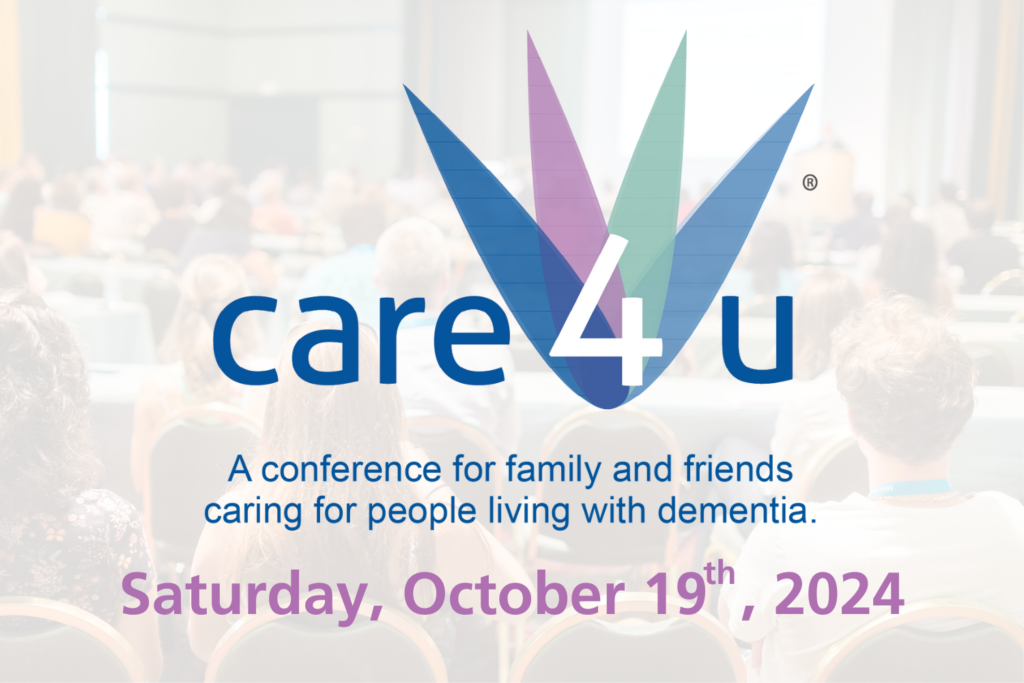 You read about this year’s Care4u opening keynote speakers, Karen Stobbe and Mondy Carter in last month’s eNewsletter, but did you know the conference also features a closing keynote presentation?
You read about this year’s Care4u opening keynote speakers, Karen Stobbe and Mondy Carter in last month’s eNewsletter, but did you know the conference also features a closing keynote presentation?
By attending Care4u, you’ll have the opportunity to hear from artist and care partner Tony Luciani, who spent years using photography to document his mom’s life and spirit as she lived with dementia. After more than 45 years as a full-time painter, Tony garnered worldwide attention with this five-year-long photography series. The photographs are a voyage of discovery, expressing the benefits of inclusion and collaboration in creativity, and pushing the boundaries of personal photography.
Tony’s keynote presentation, “A Mother and Son’s Photographic Journey Through Dementia” will take you through the stories of some of his favourite photos, which capture the joy and grief of caring for an aging parent.
Read more about Tony and his presentation at alzheimer.mb.ca/care4u.
Register for Care4u today to pick between eight other presentations covering a range of helpful caregiving topics.
The Impact of Dementia in Peguis First Nation

Sherry Asham, Community Health Representative and Wilma Murdock, Healthcare Aid (Peguis Health Centre)
Sherry Asham, Community Health Representative at Peguis Health Centre, says her community has a great need for more dementia awareness and information.
“I find there’s more and more people getting dementia, mostly older folks but some younger people are getting it too,” says Sherry. “We need more awareness to help our community understand what’s happening and get a diagnosis sooner.”
Receiving an early dementia diagnosis can help individuals and families get access to support and resources that much sooner. It can also allow someone living with dementia to be more involved in decision-making around their care.
Sherry also says more dementia awareness and information could help people care for their family members at home and in the community for as long as possible.
“Home care is available in Peguis, but this resource is limited. This makes it tough for caregivers – caring for someone with dementia can be overwhelming and stressful without the right support,” Sherry explains. “The personal care home in Peguis usually fills up quickly, which causes some people living with dementia to leave the community if they need long-term care.” 
Each September, the Alzheimer Society of Manitoba visits Peguis to give an awareness presentation and workshop on dementia for community members and local healthcare staff. Sherry says workshops like these, especially with access to attend through Zoom, are a huge help.
“There’s more access to support in Winnipeg than on the reserve,” Sherry says. “Having the Alzheimer Society come to Peguis for presentations is great, everyone wants to attend. The ability to get support through Zoom, like the Society’s education workshops, is another helpful resource for family members affected by dementia.”
Sherry says there are some differences in the way Peguis community members can receive dementia care in their community, in comparison to accessing care through Manitoba’s health care systems. For example, they might use traditional Indigenous medicines in their practice.
“I sometimes send people to our community Knowledge Keeper if they want to use traditional medicine for dementia care. Not too many people choose to use this method, but it’s always available for those who want to. Some people also use both our traditional medicine and Western care practices. It’s all about what works best for them.”
There is still little in the way of research that tells us just how much dementia impacts Indigenous communities. This is why it’s so important that we listen to the experiences of Indigenous peoples affected by dementia.
“Dementia is so diverse – understanding and recognizing how our values, traditions and culture can impact the dementia experience is crucial to being able to provide the best care and support,” says Nicole McDonald, Dementia-Friendly Communities Senior Manager at the Alzheimer Society of Manitoba.
If your community could benefit from dementia information, support or presentations, connect with Nicole at [email protected].
Lewy Body Awareness Month
October is Lewy Body Dementia Awareness Month. At the Alzheimer Society, we provide programs and services for people living with Lewy Body Dementia. Lewy Body Dementia (LBD) is caused by abnormal deposits of a protein called alpha-synuclein inside the brain’s nerve cells and it shares many similarities with Parkinson’s disease. The deposits are called ‘Lewy bodies’ after the scientist who first described them, Dr. Freidrich Heinrich Lewy.
These protein deposits – or Lewy bodies – typically affect the areas of the brain that involve thinking and movement. The built-up mass of Lewy bodies block messages between brain cells, leading to dementia.
When Lewy bodies first appear in the part of the brain responsible for thinking, the term Lewy Body Dementia is used. Parkinson’s disease dementia is the term used when Lewy bodies first appear in the part of the brain responsible for movement. LBD can occur by itself, or together with Alzheimer’s or Parkinson’s disease. It can also cause symptoms similar to Alzheimer’s and Parkinson’s disease.
To learn more about LBD, visit: Lewy Body Dementia | Alzheimer Society of Canada
If you have questions about Lewy Body Dementia or other signs and symptoms of dementia, reach out to our First Link® Client Support team by calling 204-943-6622 (Winnipeg) / 1-800-378-6699 (in Manitoba) or emailing [email protected]. Or, fill out our online form and we will give you a call.
We’re Hiring! Check Out Our Available Positions
 Come join our growing team! The Alzheimer Society of Manitoba is currently hiring for multiple positions, including Client Support Coordinators, a Communications Coordinator, a First Link® Community Coordinator and Minds in Motion® Program Facilitator. If you think you’d be a good fit for one of these positions, check out the full job postings at the following links. We invite all qualified applicants from diverse backgrounds to apply.
Come join our growing team! The Alzheimer Society of Manitoba is currently hiring for multiple positions, including Client Support Coordinators, a Communications Coordinator, a First Link® Community Coordinator and Minds in Motion® Program Facilitator. If you think you’d be a good fit for one of these positions, check out the full job postings at the following links. We invite all qualified applicants from diverse backgrounds to apply.
Client Support Coordinator job posting (will remain open until positions are filled)
Communications Coordinator job posting (will remain open until positions are filled)
First Link Community Coordinator job posting (will remain open until the position is filled)
Minds in Motion Program Facilitator job posting (will remain open until positions are filled)
After-Hours Telephone Support: Every Monday & Wednesday
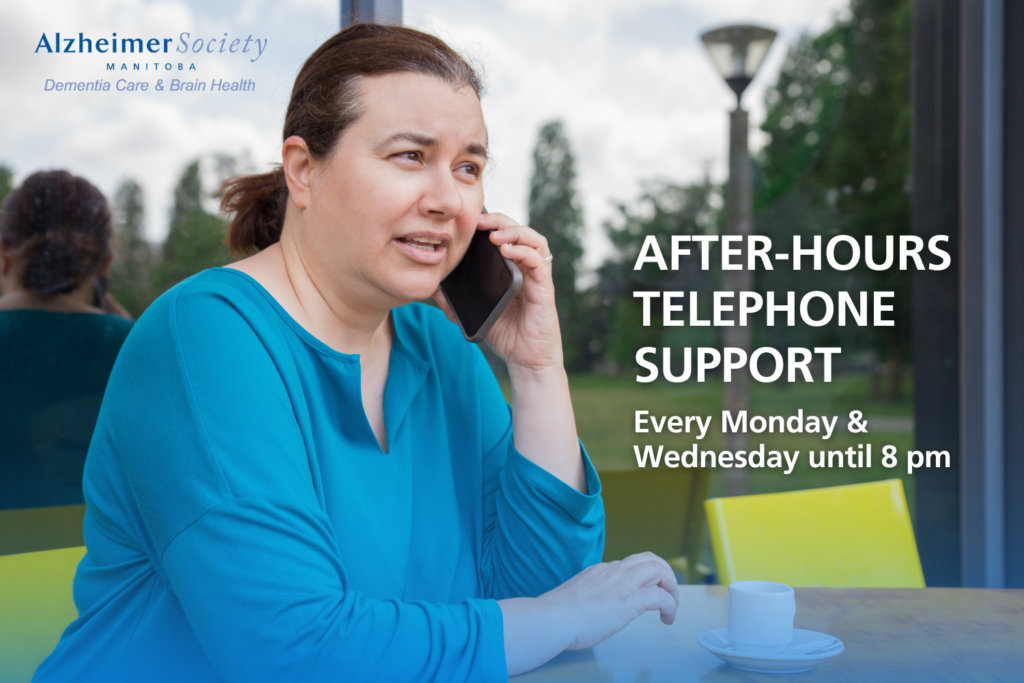 Sometimes our days can get busy with errands, appointments or work. If it’s challenging for you to call us during daytime hours, we now offer extended telephone support every Monday and Wednesday evening until 8 pm.
Sometimes our days can get busy with errands, appointments or work. If it’s challenging for you to call us during daytime hours, we now offer extended telephone support every Monday and Wednesday evening until 8 pm.
Our First Link® Client Support team is ready to listen and help guide you through all aspects of dementia or caregiving. We hope these extended hours help give more people an opportunity to connect with us for support, resources and information.
Give us a call at 204-943-6622 (Winnipeg) or 1-800-378-6622 (Provincial).
Get Involved! Community Partner Programs
We have a variety of community partner programs happening this fall – there’s something for everyone to enjoy! The Alzheimer Society partners with community organizations to create programs designed especially for people living with early to moderate symptoms of dementia to attend with their family members, friends or care partners.
Registration is open for these exciting programs:
Dalnavert Museum Dementia-Friendly Tours
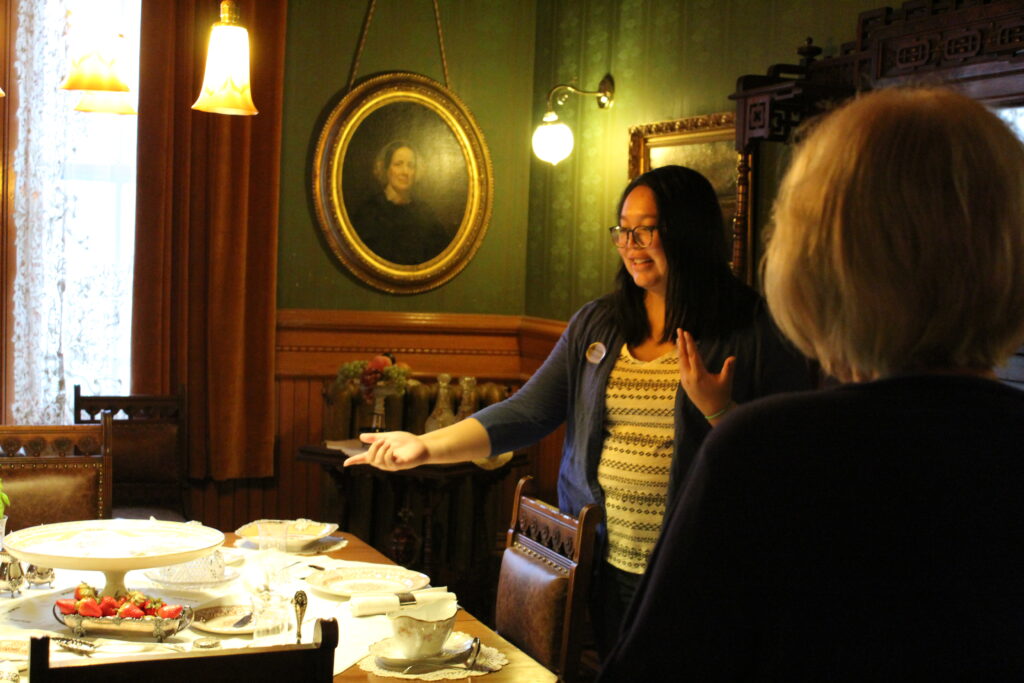 Come to the Dalnavert Museum for their monthly dementia-friendly tours. This program allows people living with early to moderate symptoms of dementia and their care partners to step back in time and explore the historic house and its collection.
Come to the Dalnavert Museum for their monthly dementia-friendly tours. This program allows people living with early to moderate symptoms of dementia and their care partners to step back in time and explore the historic house and its collection.
After your tour of the museum, join them for tea and coffee and a closer look at some artifacts.
Please note: The upper floors of the museum are only accessible by stairs. If stairs pose a barrier, there will be the option of exploring the upper floors of the house with a tour guide in the Visitors’ Centre through our virtual tour. Folding cane-seats can be borrowed free of charge during your visit and there will be seating available throughout the museum.
Monthly Program
The last Saturday of every month, 10 – 11:30 am
Cost: $24.00 (plus tax) per pair and session, $12.00 per pair and session if one of the pair is a Dalnavert Museum Member
Register today on the Dalnavert Museum and Visitors’ Centre website
Fun!-Damentals of Table Tennis (Manitoba Table Tennis Association)
 Introducing the Fun!-Damentals of Table Tennis program which connects people living with early to moderate signs of dementia and their care partners through fitness and friendship.
Introducing the Fun!-Damentals of Table Tennis program which connects people living with early to moderate signs of dementia and their care partners through fitness and friendship.
Table tennis is a great aerobic exercise with proven cognitive benefits. Participants will take part in gentle recreational play. We will teach basic techniques and rules of the game while having tons of fun.
Fall Program (10 weeks)
Cornerstone Alliance Church, 1100 Autumnwood Dr, Winnipeg
Mondays, 6 – 8 pm
Sept 9 – Dec 2, 2024
*No sessions Sept 30, Oct 14 or Nov 11*
Cost: $110 per pair
Register by emailing [email protected]
The Living Well Program (The Leaf)
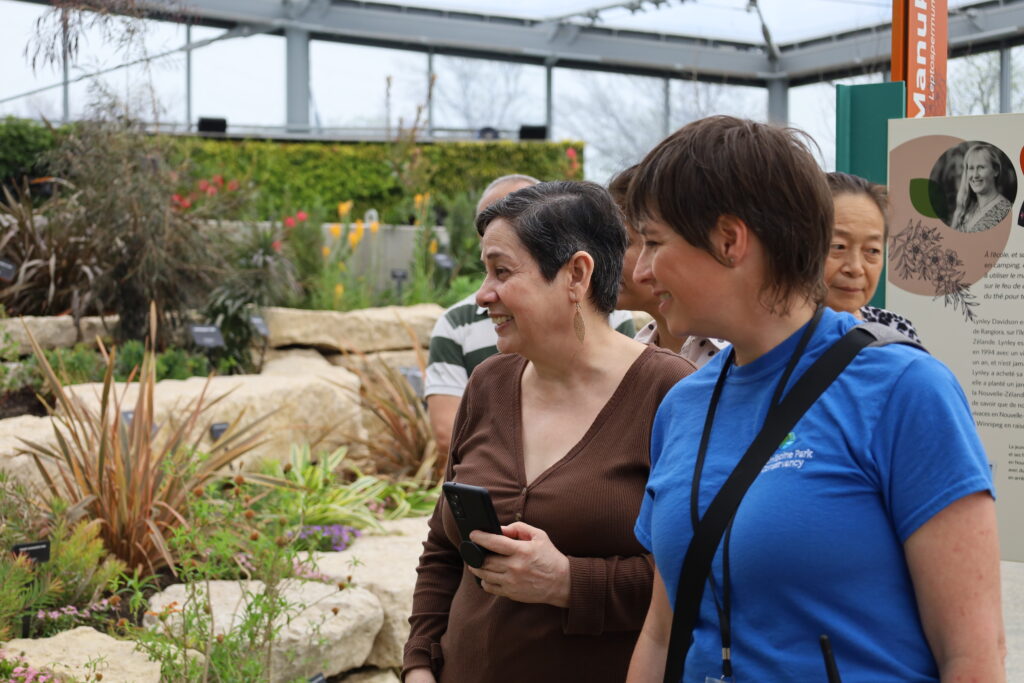 The Living Well Program enables people with early to moderate signs of dementia and their care partners to reap the social and well-being benefits of engaging with plants with the guidance of a practitioner of horticulture therapy.
The Living Well Program enables people with early to moderate signs of dementia and their care partners to reap the social and well-being benefits of engaging with plants with the guidance of a practitioner of horticulture therapy.
We cultivate a dementia-friendly community with sensory plant-based activities, fostering social engagement, and guided explorations of The Leaf and outdoor gardens when the weather permits. Every session includes refreshments.
Fall Program (6 weeks)
Tannis Richardson Indoor Classroom at The Leaf, 145 Locomotive Dr, Winnipeg
Tuesdays, 2:15 – 4 pm
Nov 5 – Dec 10, 2024
Cost: $135 + GST/couple
Register on the Assiniboine Park Conservancy website, under “Recreation and Leisure”
Tune-Up Café (Convalescent Home of Winnipeg)
 Tune-Up Café is for individuals living with early to moderate signs of dementia and their care partners. It’s an inclusive and welcoming meeting place for singing, making social connections and sipping on a cuppa!
Tune-Up Café is for individuals living with early to moderate signs of dementia and their care partners. It’s an inclusive and welcoming meeting place for singing, making social connections and sipping on a cuppa!
Fall Program
Convalescent Home of Winnipeg, 276 Hugo St North, Winnipeg
Tuesdays, 6:15 – 8 pm
There is no fee to attend, but registration is required.
Contact Sherry at [email protected] for more information and to register.
Vivace Voices Choir (Canadian Mennonite University)
 Come and join us in making music together! Singing in a choir is a challenging and joyful experience. In this program, people living with early to moderate signs of dementia and their care partners will learn to sing new and familiar music while making connections with those around them. No prior choral experience is required.
Come and join us in making music together! Singing in a choir is a challenging and joyful experience. In this program, people living with early to moderate signs of dementia and their care partners will learn to sing new and familiar music while making connections with those around them. No prior choral experience is required.
Fall Program (10 weeks)
Canadian Mennonite University (North Campus), 500 Shaftesbury Blv.
Tuesdays, 6:30 – 7:30 pm
Oct 8 – Dec 17, 2024
Winter Program (11 weeks)
Canadian Mennonite University (North Campus), 500 Shaftesbury Blv.
Tuesdays, 6:30 – 7:30 pm
Jan 28 – April 8, 2025
Cost: $145/pair OR $280/pair for both fall 2024 & winter 2025 programs
Learn more and register now on the CMU website
Registration Still Open for Minds in Motion®
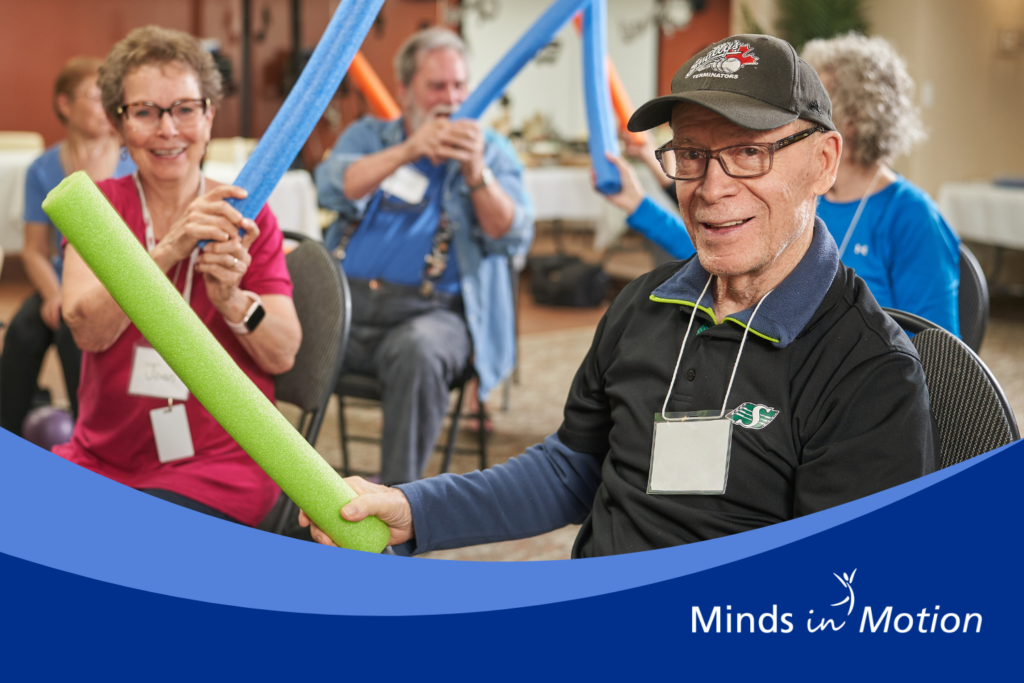 Come join us for gentle chair fitness, fun and recreation at Minds in Motion this fall!
Come join us for gentle chair fitness, fun and recreation at Minds in Motion this fall!
Our popular Minds in Motion program connects people living with early to moderate signs of dementia and their care partners through fitness, fun and friendship. Participants take part in a gentle chair fitness class followed by socially engaging activity and conversation. There are lots of laughs and social interaction during these sessions.
Visit our Minds in Motion page for more information and to register now.
(Cost is $65/pair unless noted).
See below for locations still accepting registration:
Winnipeg Locations
Rady JCC Fitness Centre – 123 Doncaster St
Wednesdays, 10 am – 12 pm
Oct 16 – Dec 4
Call to register: 204-477-7510
Riverwood Square – 1778 Pembina Hwy
Tuesdays, 10 am – 12 pm
Oct 15 – Dec 3
Call to register: 204-275-7632
The Wellness Institute – 1075 Leila Ave
Wednesdays, 1:30 – 3:30 pm AND 6 – 8 pm
Oct 16 – Dec 4
Call to register: 204-632-3900
YMCA (Elmwood-Kildonan) – 454 Kimberly Ave
Thursdays, 1:30 – 3:30 pm
Oct 17 – Dec 5
Call to register: 204-668-8140
YMCA (West Portage) – 3550 Portage Ave
Tuesdays, 1 – 3 pm
Oct 15 – Dec 3
Call to register: 204-889-8052
Regional Locations
ALTONA
The Gardens on Tenth – 140 10 Ave NE
Mondays, 1:30 – 3:30 pm
Sept 16 – Nov 25
*NO SESSIONS ON SEPT 30, OCT 14, NOV 11*
Call to register: 1-204-324-8945
BRANDON
Seniors for Seniors – 311 Park Ave East
Thursdays, 1:30 – 3:30 pm
Session #1: Sept 12 – Oct 31
Session #2: Nov 14 – Jan 23
Call to register: 1-204-571-2050
GLADSTONE
Senior Support office, 36 Morris Ave N
Wednesdays, 10 am – 12 pm
Oct 16 – Dec 4
*Open to those in the Gladstone, Plumas and Neepawa areas*
Call to register: 1-204-385-3026
PORTAGE LA PRAIRIE
Herman Prior Centre – 40 Royal Rd North
Wednesdays, 1:30 – 3:30 pm
Sept 18 – Nov 6
Call to register: 1-204-857-6951
SELKIRK
Gordon Howard Centre – 384 Eveline St
Wednesdays, 1 – 3 pm
Sept 18 – Nov 6
Call to register: 1-204-785-2092
SHOAL LAKE
Shoal Lake Drop-In Centre – 605 4th Ave
Tuesdays, 10 am – 12 pm
Oct 15 – Dec 3
Call to register: 1-204-759-3363 or email: [email protected]
STEINBACH
Pat Porter Active Living Centre – 10 Chrysler Gate
Wednesdays, 10 am – 12 pm
Sept 25 – Nov 13
Call to register: 1-204-320-4600
Join a Support Group this Fall!
Our support groups give you the opportunity to learn more about dementia, share day-to-day coping strategies and participate in meaningful discussions with others who know what you’re going through because they’ve experienced it themselves.
There are a variety of support groups to choose from, including groups for people living with dementia and groups for care partners. Here are a few groups running this fall currently open for registration:
In-person Care Partner Support Group (Beausejour)
- *New Time/Location*
East-Gate Lodge Personal Care Home, 646 James St.
Second Tuesday of the month at 6:30 – 8 pm
To register, contact [email protected]
Ambiguous Loss Support Group
Virtual via Zoom
- Adult children: Thursday evenings, Oct. 10 to Nov. 28, from 7 – 8:30 pm
- Spousal: Tuesday evenings, Oct. 8 to Nov. 26, from 6:30 – 8 pm
Bereavement Support Group (virtual via Zoom)
- Thursdays, Oct. 17 to Dec. 12, from 1:30 – 3 pm
Call us at 204-943-6622/1-800-378-6622 or email [email protected] to register for a support group or to discover the best group to meet your needs.
For a complete listing of support groups, visit the links below:
Support Groups for Care Partners
Support Groups for People Living with Dementia
We welcome everyone to this inclusive environment for people of different ethnicities, cultures or persons who identify as part of the 2SLGBTQ+ community.
Planning for Holiday Meals
 With Thanksgiving just around the corner, you might be thinking about the best way to meet the needs of a family member or friend living with dementia to help them safely enjoy a holiday meal.
With Thanksgiving just around the corner, you might be thinking about the best way to meet the needs of a family member or friend living with dementia to help them safely enjoy a holiday meal.
Dementia can affect someone’s ability to eat or drink and get enjoyment from their food. Some factors that can cause people living with dementia to experience difficulty eating and drinking are:
- Forgetting how to prepare a meal
- Having challenges with how to use utensils
- Not knowing what to do with food that is placed in front of them
- Putting too much food in their mouth at once
- Eating too quickly
- Trying to swallow without chewing
- Trying to eat inedible items
Poor appetite can also affect someone living with dementia, so when visiting a family member or friend, try to focus on the interaction rather than on how much they eat.
Some things to think about to make mealtime more comfortable and enjoyable are:
- Limit distractions – serve meals in quiet surroundings, away from the television and other distractions.
- Keep the table setting simple – avoid patterned plates, tablecloths and placemats that may be confusing. Provide only the utensils needed for the meal to avoid confusion.
- Distinguish food from the plate – it can help to use plates or bowls that contrast the colour of the food and placemat.
- Check the food temperature – dementia may affect someone’s ability to recognize if something is too hot to eat or drink.
- Offer one food item at a time – serving one or two things at a time can be helpful.
- Allow plenty of time to eat – not rushing allows the person to savour the food. Also, take into consideration any mobility problems that can slow down eating.
- Eat together – keeping a meal social can encourage them to eat.
- Prepare foods so that they aren’t hard to chew or swallow – cut food into bite-sized pieces, or serve soft foods.
Keeping someone living with dementia involved in mealtimes is important for their well-being. By caring, prompting and adapting a holiday meal, you can help someone living with dementia get the most out of their time with family and friends and safely enjoy food and drink.
To learn more about how mealtimes and nutrition can be impacted by dementia, and how to safely adapt mealtime, check out our family education session, “Mealtimes and Nutrition” taking place on Tuesday, October 15 from 10 – 11 am. This education session is free and offered via Zoom. Click here to register.
Check Out Our Free Online Education Sessions
 We’ve got a full calendar of education sessions this fall, covering a variety of caregiving topics including mealtimes and nutrition, legal and financial matters, the importance of physical activity in care partner risk reduction and more. These sessions are free to attend and offered via Zoom.
We’ve got a full calendar of education sessions this fall, covering a variety of caregiving topics including mealtimes and nutrition, legal and financial matters, the importance of physical activity in care partner risk reduction and more. These sessions are free to attend and offered via Zoom.
Click here to register for all Family Education sessions.
Here’s what’s coming up:
Mealtimes and Nutrition
Food and mealtimes are important aspects of a person’s life, but food intake and meal enjoyment can change as dementia progresses. Understanding the eating habits of someone with dementia can help you understand changes in preferences and behaviour. Learn from Catherine and Tori as they discuss these changes, and how mealtimes can be adapted safely.
Tuesday, October 15 | 10 -11 am
Living with Dementia First Steps – Part 2
*Please note you do not need to attend the Living with Dementia series in order. The second session of a three-part information series for people supporting someone recently diagnosed with dementia. In this webinar, learn about the legal and financial matters related to dementia, to help ensure that your affairs are together for you and your family.
Saturday, November 2 | 10 – 11:45 am
Medical Assistance in Dying (MAiD)
It’s important to have updated and accurate information about MAiD. This session will provide participants with details about:
• updates to the federal legislation and its implementation in Manitoba, particularly in relation to individuals with dementia
• the “what, when, who, why and how” as these questions pertain to MAiD in Manitoba
Tuesday, November 12 | 2 – 3 pm
Family Education: Next Steps: You can choose to watch these online sessions in-person at the Alzheimer Society office (10-120 Donald Street, Winnipeg) – the speaker will not be presenting in-person. Please email [email protected] if you are interested in this option.
Visit the link below to view our full Fall 2024 education calendar.
Family Education | Fall 2024 Calendar
Family Education programs sponsored by:
Follow Us On Social Media
Join us on Facebook, Instagram, LinkedIn and X (formerly Twitter) for the most current news, information and resources. If you’re already following us on social media, invite your friends to do the same!
X (formerly Twitter)
We Rely on Your Donations to Continue Our Work

Your gifts are put to immediate use through our First Link Client Support team, support groups and education programs.
Remember. You Are Not Alone.
Are you struggling to figure out your next steps? Our First Link® Client Support team is here to listen and help guide you through difficult times – from when you are concerned about your own, a family member or a friend’s memory, right through to the later symptoms of dementia. Call us today at 204-943-6622 (Wpg) / 1-800-378-6622 (MB), email [email protected] or fill out our online form and we will reach out to you.


